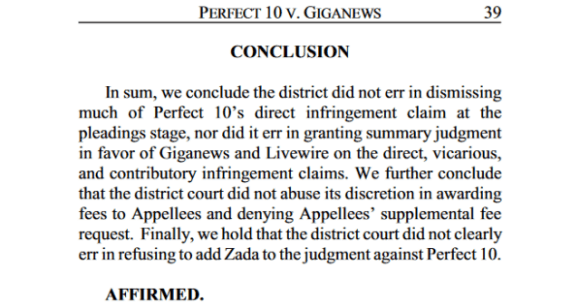Jan. 2017 update – Giganews has once again prevailed in the court of appeals over Perfect 10. Cheers to the Giganews team on their continued efforts.You can read the full verdict from the US Court of Appeals for the 9th Circuit. Here’s a view of the conclusion in which the court of appeals affirms the district court’s decision. Read Giganews related blog post to learn more about the legal victory and their response.

Feb. 2014 update – Last week Giganews scored a legal victory for Usenet. The case involved Perfect 10 suing Giganews for copyright infringement. They contended in part that Giganews was not protected by the DMCA Safe Harbor provision and that they were willfully distributing copyrighted content owned by Perfect 10. The case started back in 2011 and recently brought a nice victory for Giganews and the Usenet community in general.
We’ll touch on a few of the issues brought forth in the Perfect 10 vs. Giganews case. You can learn more by reading the verdict here. It’s only 21 pages and is an interesting read for anyone who has ever wondered just how DMCA is supposed to work. As it turns out Giganews is right in line with what the DMCA and Safe Harbor were meant to protect. The case set some nice legal precedent to help protect Usenet providers in the future.
In reading the judgement you can tell that the judge wasn’t impressed by the case presented by Perfect 10. They were very sloppy in their arguments. Which isn’t all that surprising given their previous loses in court. They seem hell bent on suing technology companies. Trolling can be a lucrative business these days I suppose. Instead this case helped define what expectations Usenet providers will have in terms of DMCA requests.
We’re not going to spend time explaining the Digital Millennium Copyright Act (DMCA) because the judgement goes into detail for those who want to learn more about DMCA and Usenet. Instead I want to share some of the arguments Perfect 10 made in the case along with the court’s response. We’ll start with how Perfect 10 presented Giganews with takedown requests and then move on to some of the other issues in the case.
How Not to Present a DMCA Takedown Notice
Giganews has a page on their site that clearly defines the information they need for DMCA notices:
- Clear identification of the person or entity submitting the DMCA Notice.
- Clearly stated relationship to the copyright holder (self or authorized agent).
- Message-IDs for all articles the DMCA Notice is requesting Giganews take down. Please keep in mind some files are large enough to be posted across several Usenet articles; these are called multi-part posts. Be certain to identify by Message-ID all articles you want taken down.
- Clear statement, under penalty of perjury, that the information in the notification is accurate and that you are copyright holder, or authorized to act on behalf of the copyright holder.
- A “physical or electronic signature” of an authorized person to act on behalf of the owner. This is fulfilled by a name and a physical address that the authorized individual can be contacted should someone wish to contest your notification.
- While not legally required by the DMCA, including “copyright violation” in the subject line of your email will flag your DMCA Notice and bypass spam categorization.
- Submit the Notice to dmca2008@giganews.com, the email address we have registered with the Copyright office pursuant to Section 512(c) of the Copyright Act.
Did Perfect 10 follow those instructions? Not at all. According to the court documents Perfect 10 presented Giganews with a series of screenshots. The images showed them using a newsreader to search for related content. They sent that information over to Giganews and told them to remove everything related to those searches. Nevermind that they didn’t provide the message ID’s for the articles to be deleted.
You can think of the message ID on a Usenet post like you would a URL for a web page. In order to remove content from a news server the provider needs to know exactly what to delete. A screenshot of a search performed in a newsreader isn’t at all adequate. Imagine trying to deal with that kind of notice to find and remove specific posts. There are so many flaws in that approach. Thankfully the court agreed.
Yet another issue in the case was whether or not Giganews properly dealt with repeat infringers. This is important to falling under safe harbor protection. Something that technology companies like Google as well as Usenet providers rely on. Giganews was able to show that they warn users after the first notice and terminate their account after any subsequent notices. That’s their stance on dealing with repeat infringers.
Again the court agreed with Giganews. At question was why Giganews hadn’t kicked off more users. That really comes down to the decentralized nature of Usenet. Just because Giganews receives a DMCA notice and removes content doesn’t mean it was posted on their service. What if the content was posted by an Astraweb customer. Giganews certainly can’t terminate their account. Once again the court understood and agreed.
One other issue we found interesting had to do with peering. Since Usenet is decentralized it relies on peering between news servers. User generated content is copied between those servers. Perfect 10 questioned whether or not the copying of data should be considered copyright infringement. The judge sided with Giganews in that data being copied between servers in being done on behalf of the user that posted it.
This is a clear victory for Giganews and the Usenet community in general. Cheers to the Giganews team for defending Usenet and setting some important legal precedent. That’s a great way to kick off the new year.
You can visit Newsgroup Reviews to learn more about Usenet and join us on Twitter @NewsgroupRevs.



